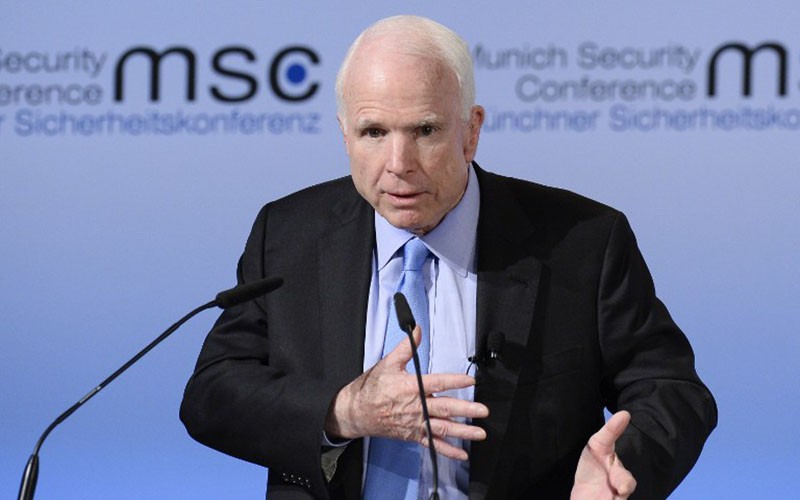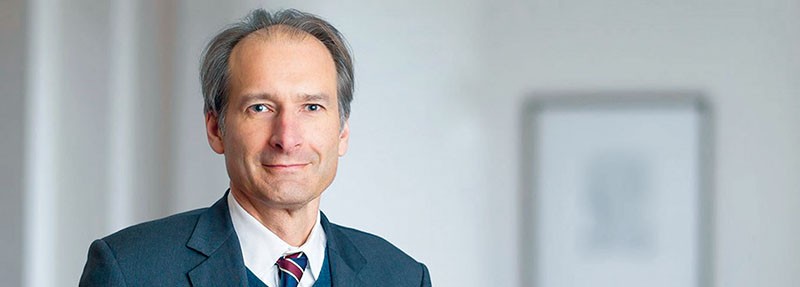Editor’s Note: This feature separates Ukraine’s friends from its enemies The Order of Yaroslav the Wise has been given since 1995 for distinguished service to the nation. It is named after the Kyivan Rus leader from 1019-1054, when the medieval empire reached its zenith. The Order of Lenin was the highest decoration bestowed by the Soviet Union, whose demise Russian President Vladimir Putin mourns. It is named after Vladimir Lenin, whose corpse still rots on the Kremlin’s Red Square, 100 years after the October Revolution he led.

US senator John McCain speaks on the first day of the 53rd Munich Security Conference (MSC) at the Bayerischer Hof hotel in Munich, southern Germany, on Feb. 17. (AFP)
John McCain
With U. S. Sen John McCain in office, Ukraine can rest a little easier. While the Republican of Arizona didn’t say anything particularly notable on Russia’s war against Ukraine this week, his strong stance – and those of other members of Congress of both parties – are starting to show results.
The U. S. House of Representatives this week authorized $150 million in lethal weapons aid to Ukraine, on top of the $200 million authorized by Congress last year but unspent as ex-U.S. President Barack Obama blocked weapons aid to Ukraine. McCain is expected to lead a similar effort in the U. S. Senate.
About Obama, McCain recently tweeted that the former president was “too soft” on Russia. “Let’s take a different course together: give defensive lethal assistance to Ukraine and keep sanctions on Russia,” McCain wrote.
The trick will be to get U. S. President Donald J. Trump to change course, dropping his soft stand on Russia. Already the bipartisan majority in Congress appears to be having some effect, with the Trump administration last month saying the the president expects Russia to return Crimea to Ukraine and end the war in Ukraine’s eastern Donbas.
McCain also has had some memorable taunts of Russian dictator Vladimir Putin, saying he looked into his eyes and didn’t see his soul (as ex-U.S. President George W. Bush once said). Rather, McCain said, he saw three letters: “KGB” after Putin’s background in the Soviet Union. He also has taunted Putin’s leadership, calling Russia in 2014 “a gas station masquerading as a country.”
As long as McCain is around, Ukraine will have a powerful voice in the corridors of U. S. Congress.

Samuel Wordsworth
“If there were no bad people, there would be no good lawyers,” English novelist Charles Dickens once wrote. And this week, in the International Court of Justice in The Hague in the Netherlands, the “bad people” (the Russian government) were certainly using the services of a good lawyer – Samuel Wordsworth QC.
No doubt Wordsworth, a British expert in international law, is an honorable man as well as being a good lawyer.
But he is defending in a United Nations court a state that has committed numerous acts of aggression and war crimes against Ukraine, a state that is illegally occupying part of the country and one that started a war that has cost 10,000 lives. For us, that makes him this week’s foe.
Following up on the absurd testimony to the UN court by his fellow representative of Russia, the Russian Foreign Ministry’s Ilya Rogachev, who claimed that “Ukrainian rebels” found advanced Russian weapons and tanks “in mines,” Wordsworth made a key point that could help win the case for Russia.
Ukraine is arguing that Russia has committed acts of terrorism in Ukraine. The most notorious of those acts is the shooting down of Malaysian Airlines flight MH17 over the Donbas on July 17, 2014 by a Russian-supplied Buk anti-aircraft system, killing all 298 people on board.
Wordsworth argued that there was no evidence that Russia had supplied weapons to anyone in Ukraine “with the intent and knowledge that such weaponry (would) be used to shoot down civilian aircraft.”
That’s quite probably true. Most likely, the Russians supplied the Buk to their proxy forces with the intention of using it to shoot down Ukrainian military aircraft, which at that time were helping Ukraine defeat the “rebels.”
With his clever wordcraft, Wordsworth may persuade the judges that the MH17 tragedy was, technically, not an act of terrorism for which Russia can be blamed.
But he also did not dispute that Russia had indeed supplied the Buk system to Ukraine – something the Kremlin has consistently denied. He couldn’t: the evidence that has emerged so far from the international investigation into that crime is just too strong – even for a good lawyer.
So, by conspicuously failing to repeat Russia’s previous denials, Wordsworth may have unintentionally weakened Russia’s line of defense in the MH17 case, and end up becoming a friend of Ukraine, and the international community. Let’s hope so.
